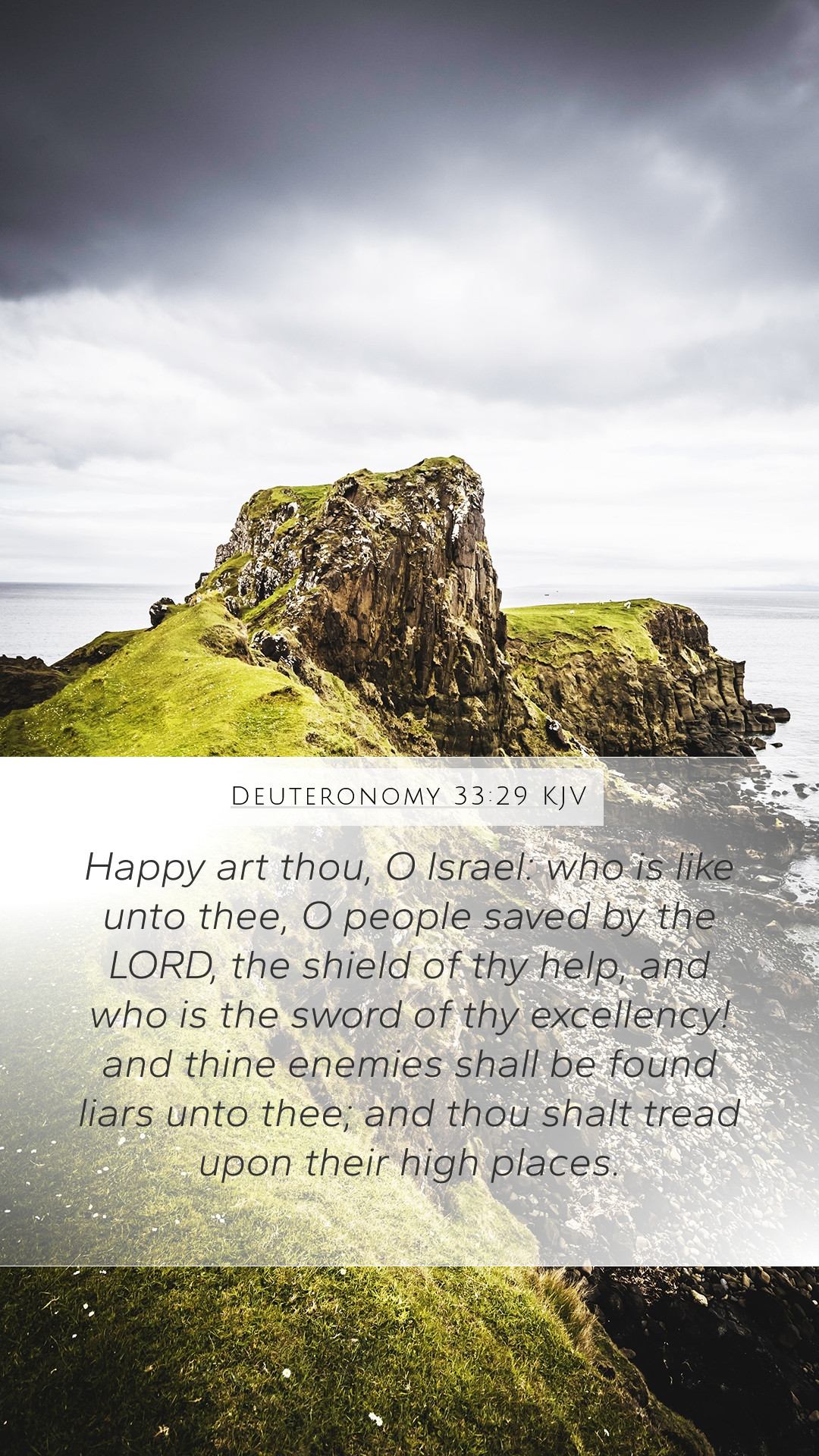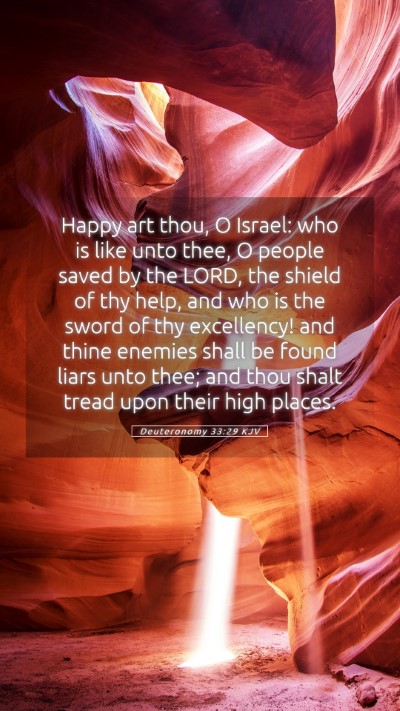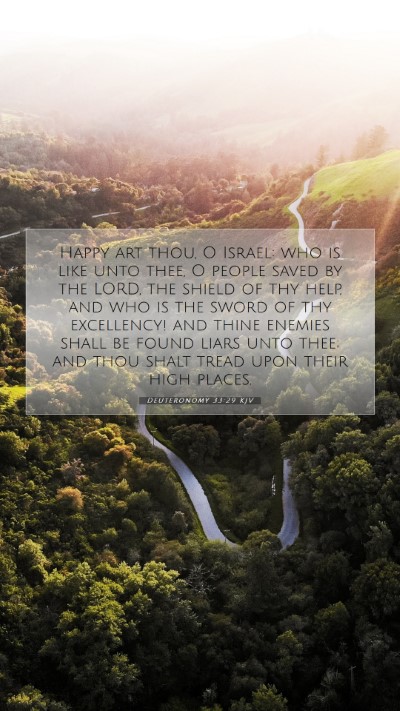Understanding Deuteronomy 33:29
Bible Verse: Deuteronomy 33:29
“Happy art thou, O Israel: who is like unto thee, O people saved by the Lord, the shield of thy help, and who is the sword of thy excellency! And thine enemies shall be found liars unto thee; and thou shalt tread upon their high places.”
Overview of Deuteronomy 33:29
Deuteronomy 33:29 presents a profound declaration regarding the unique status of Israel as a chosen people, blessed and safeguarded by God. In this verse, Moses delivers a blessing in a farewell address, emphasizing Israel's happiness and divine protection. This verse serves to encourage the Israelites and reassure them of their identity and relationship with God.
Bible Verse Meanings
According to various public domain commentaries, the meanings of this verse can be explored from several angles:
- Happiness of Israel: The term "happy" signifies a state of blessedness associated with the fulfillment of God's promises. Matthew Henry indicates that true happiness comes from an acknowledgment of God's work in one's life.
- Comparison to Other Nations: The rhetorical question "who is like unto thee?" emphasizes Israel's uniqueness. Albert Barnes suggests that no other nation enjoys the same level of divine favor and security, underscoring Israel's distinct covenant relationship with God.
- Divine Protection: The phrase "the shield of thy help" indicates God as a protector. Adam Clarke notes that God defends Israel as a soldier's shield protects in battle, highlighting the assurance of victory through divine intervention.
- Defeat of Enemies: The assurance that "thine enemies shall be found liars" speaks to the ultimate triumph of Israel over adversaries. This affirmation emphasizes that those who oppose Israel will ultimately be proven wrong, as God fights on their behalf.
- Conquest and Authority: "Thou shalt tread upon their high places" signifies victory and dominance over Israel's foes. This is a prophetic statement of Israel's future conquests and the establishment of their authority in the Promised Land.
Bible Verse Interpretations
The interpretations of Deuteronomy 33:29 can be layered and diverse:
- Covenantal Perspective: Commentators stress the theological underpinnings of this verse. It reflects God's covenantal love for Israel, affirming that their identity is rooted in divine promise.
- Ethical Implications: Believers today may find applications in personal conduct, fostering a sense of peace and confidence derived from knowing God’s protective presence in their lives.
- Community Assurance: For modern congregations, this verse can be a source of encouragement, promoting unity and a reminder of the collective welfare under God's guidance.
Bible Verse Understanding
Understanding Deuteronomy 33:29 requires recognizing the historical context in which it was given:
- Historical Context: Written during the final days of Moses, this verse served as a testament to Israel's journey from slavery to becoming a nation under God’s guidance.
- Liturgical Context: This blessing was likely recited during communal gatherings, reinforcing identity and purpose among the people.
- Prophetic Significance: The verse also serves a prophetic role, looking forward to the destiny of Israel in conquest and establishment of the kingdom, resonating with later biblical themes.
Bible Verse Explanations
Explaining this verse in detail brings forth several vital lessons:
- God’s Faithfulness: The emphasis on God as a shield serves to remind readers of His promise to protect and deliver, a theme that recurs throughout the scriptures.
- Identity and Purpose: Israel's identity as God’s chosen people is a powerful notion that imparts a purpose and calling that transcends generations.
- Victory Assurance: The notion of overcoming adversaries provides hope and resilience, encouraging believers to confront their challenges with faith.
Biblical Exegesis on Deuteronomy 33:29
The practice of biblical exegesis deepens comprehension of this rich text:
- Textual Analysis: Each phrase in this verse deserves examination. The use of “shield” and “sword” symbolizes both protective and aggressive roles of God in the believer’s life.
- Literary Devices: The rhetorical question enhances its persuasive power, inviting reflection on the special standing of Israel.
- Intertextual Connections: Connecting this verse to Psalms and prophecies in the Old and New Testaments reveals a continuity of divine protection and victory themes throughout Scripture.
Bible Study Insights
Engaging with Deuteronomy 33:29 encourages meaningful discussions in Bible study groups:
- Group Reflection: Discuss how this verse provides reassurance in current circumstances, drawing parallels between the historical context and modern-day challenges.
- Application of Teachings: Explore practical applications of the sense of security found in God, particularly in facing personal adversities.
- Prayer and Worship: Utilize this verse in prayer sessions, inviting members to express gratitude for God’s protection and presence in their lives.
Cross References
Deuteronomy 33:29 is related to several other biblical passages that reinforce its themes:
- Psalms 33:12: “Blessed is the nation whose God is the Lord, the people whom he has chosen as his heritage.”
- Psalms 28:7: “The Lord is my strength and my shield; in him my heart trusts, and I am helped; my heart exults, and with my song I give thanks to him.”
- Isaiah 41:10: “Fear not, for I am with you; be not dismayed, for I am your God; I will strengthen you, I will help you, I will uphold you with my righteous right hand.”
Conclusion
In summary, Deuteronomy 33:29 powerfully encapsulates themes of divine protection, unique identity, and the assurance of victory for Israel. Through this exploration, we uncover profound insights, providing a basis for understanding scripture, facilitating discussions in Bible study groups, and applying these messages meaningfully in our daily lives.


